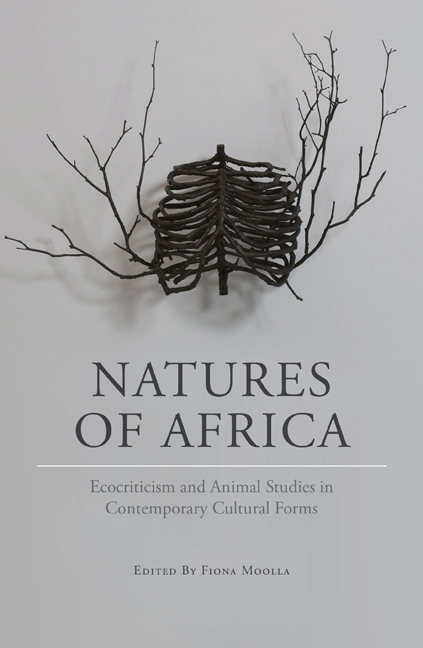Book contents
- Frontmatter
- Table of Contents
- Foreword
- Introduction
- 1 ‘Here is Some Baobab Leaf!’: Sunjata, Foodways and Biopiracy
- 2 Shona as a Land-Based Nature-Culture: A Study of the (Re)Construction of Shona Land Mythology in Popular Songs
- 3 The Environment as Significant Other: The Green Nature of Shona Indigenous Religion
- 4 Animal Oral Praise Poetry and the Samburu Desire to Survive
- 5 The Paradoxes of Voluntourism: Strategic Visual Tropes of the Natural on South African Voluntourism Websites
- 6 Towards an Ecocriticism in Africa: Literary Aesthetics in African Environmental Literature
- 7 Critical Intersections: Ecocriticism, Globalised Cities and African Narrative, with a Focus on K. Sello Duiker's Thirteen Cents
- 8 Navigating Gariep Country: Writing Nature-Culture in Borderline by William Dicey
- 9 Negotiating Identity in a Vanishing Geography: Home, Environment and Displacement in Helon Habila's Oil on Water
- 10 Human Masks? Animal Narrators in Patrice Nganang's Dog Days: An Animal Chronicle and Alain Mabanckou's Memoirs of a Porcupine
- 11 Nature, Animism and Humanity in Anglophone Nigerian Poetry
- 12 Animals, Nostalgia and Zimbabwe's Rural Landscape in the Poetry of Chenjerai Hove and Musaemura Zimunya
- About the authors
- Acknowledgements
- Notes
- Index
3 - The Environment as Significant Other: The Green Nature of Shona Indigenous Religion
Published online by Cambridge University Press: 10 May 2018
- Frontmatter
- Table of Contents
- Foreword
- Introduction
- 1 ‘Here is Some Baobab Leaf!’: Sunjata, Foodways and Biopiracy
- 2 Shona as a Land-Based Nature-Culture: A Study of the (Re)Construction of Shona Land Mythology in Popular Songs
- 3 The Environment as Significant Other: The Green Nature of Shona Indigenous Religion
- 4 Animal Oral Praise Poetry and the Samburu Desire to Survive
- 5 The Paradoxes of Voluntourism: Strategic Visual Tropes of the Natural on South African Voluntourism Websites
- 6 Towards an Ecocriticism in Africa: Literary Aesthetics in African Environmental Literature
- 7 Critical Intersections: Ecocriticism, Globalised Cities and African Narrative, with a Focus on K. Sello Duiker's Thirteen Cents
- 8 Navigating Gariep Country: Writing Nature-Culture in Borderline by William Dicey
- 9 Negotiating Identity in a Vanishing Geography: Home, Environment and Displacement in Helon Habila's Oil on Water
- 10 Human Masks? Animal Narrators in Patrice Nganang's Dog Days: An Animal Chronicle and Alain Mabanckou's Memoirs of a Porcupine
- 11 Nature, Animism and Humanity in Anglophone Nigerian Poetry
- 12 Animals, Nostalgia and Zimbabwe's Rural Landscape in the Poetry of Chenjerai Hove and Musaemura Zimunya
- About the authors
- Acknowledgements
- Notes
- Index
Summary
Renhasi rapfuura, remangwana rinozihwa naNyadenga.
(Today has passed, but tomorrow's events are known only by the Heavenly One.)
The Shona expression above is a classic example of how religion has always played a central role in Africa's existence – even when people go to sleep, they talk to their Creator. Every occurrence, no matter how small, has a religious ritual or ceremony attached to it. This expression indicates the depth of African religiosity. Although people may not recite these words as a prayer, they are nevertheless an admission that they leave everything in the hands of their Creator. The statement ‘Renhasi rapfuura …’ captures the belief that the Creator (in Shona, Musiki or Musikavanhu) takes care of each of their living days. These words, even though uttered in an environment that, in the sense of Western Christianity some time ago may not have been considered as religious by most denominations, go a long way to underscoring the reality about Africans – that they are a religious people.
Since early colonial perceptions about Africa as backward and savage, the world has moved on and has embraced the continent. As a result of growing religious dialogue and respect for other people's religious beliefs and practices, hegemonic European cultural practices are on the wane. Most people in Europe and the Americas have come to appreciate that African cultures do not need to be taught to respect nature from Europe.
This chapter examines what Shona indigenous religion says about nature and why it qualifies as a ‘green religion’. I argue that it is a religion based on practice, as opposed to a green religion based on preaching.
The nature of African indigenous religions
African indigenous religions are deliberately given this nomenclature because they are religions that are largely indigenous to Africa and are founded on African soil, although some have been exported to the diaspora through the slave trade. These religions are handed down from one generation to another; they are also part and parcel of African life. They are an amalgamation of religions that pre-date Christianity and Islam. Therefore, they entail religious practices that are founded on millennia of accumulated wisdom and experiences, and act as guides for good moral behaviour and ethical environmental practices – all done for the common good.
- Type
- Chapter
- Information
- Natures of AfricaEcocriticism and Animal Studies in Contemporary Cultural Forms, pp. 77 - 96Publisher: Wits University PressPrint publication year: 2016

